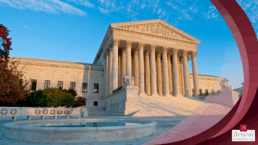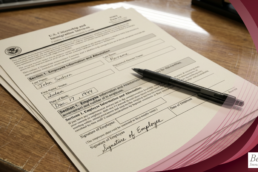The U.S. Supreme Court officially begins its 2025-2026 term on October 6, 2025, with hearings and decisions expected to stretch into early summer 2026. This year’s docket includes 33 cases already granted review, with 19 scheduled for oral arguments in the first months of the term.
While no immigration-specific cases have been argued yet, the Court’s emergency docket has been filled with immigration activity over the last year. Recent emergency orders have permitted:
- The termination of federal employees in large numbers.
- The revocation of parole status for noncitizens.
- Deportations to third-party countries without mandatory torture risk assessments.
Adding to the list of high-stakes matters, the Trump administration has now asked the Court to review a case challenging birthright citizenship, a bedrock principle of U.S. immigration law.
What Is Birthright Citizenship?
Birthright citizenship is the legal guarantee that anyone born on U.S. soil automatically becomes a U.S. citizen, regardless of their parents’ immigration status. This principle comes from the 14th Amendment of the U.S. Constitution, ratified in 1868, which declares that “all persons born or naturalized in the United States…are citizens of the United States.”
For more than 150 years, birthright citizenship has been seen as a settled constitutional right. However, in recent years, some political leaders have questioned whether children of noncitizens (especially those without legal immigration status) should automatically gain U.S. citizenship.
The new request before the Supreme Court aims to limit or eliminate this long-standing guarantee.
Why the Court’s Review Matters
If the Supreme Court agrees to hear the birthright citizenship challenge, the decision would have profound consequences for millions of families. Eliminating or narrowing this right could create a class of stateless children born in the U.S. but unable to claim citizenship in any country. It would also raise immediate questions about the status of U.S.-born children whose parents are undocumented, on temporary visas, or living in the country under humanitarian protections.
As Managing Partner Rosanna Berardi, Esq., explains:
“Birthright citizenship has always been a cornerstone of American immigration law. If the Court redefines who qualifies, families across the country will face enormous uncertainty. This isn’t just a legal debate, it could fundamentally alter the lives of children born here.”
The Bigger Picture: SCOTUS and Immigration
This is not the only immigration issue on the Court’s radar. Pending appeals include questions about Temporary Protected Status (TPS) for Venezuelan nationals and the scope of executive authority over parole programs. The Court’s willingness to take up emergency immigration cases suggests that the justices may be more open than ever to reshaping long-standing immigration principles.
Historically, the Supreme Court has played a limited role in day-to-day immigration disputes, leaving much of the policymaking to Congress and executive agencies. But in recent years, the justices have been asked to weigh in more frequently on immigration policy battles, often through emergency requests.
What Families and Businesses Should Do Now
For immigrants, families, and employers, these developments are unsettling. The rules that govern who can stay, work, or become a U.S. citizen are shifting rapidly, and Supreme Court decisions have the power to change the landscape overnight.
At Berardi Immigration Law, we recommend:
- Staying informed: Immigration law is changing rapidly, and rumors often spread faster than facts. Be sure to rely on official government updates, reputable news outlets, and trusted immigration professionals rather than social media speculation, which can be misleading or incomplete.
- Reviewing status documents: Take time to carefully review your immigration records, permits, and applications to confirm they are accurate and current. This is especially important if you rely on Temporary Protected Status (TPS), parole, or other temporary programs, since missing an update or renewal deadline could put your legal status at risk.
- Seeking legal guidance: If you are worried about how potential Supreme Court decisions could affect your child’s citizenship, your own immigration status, or your ability to remain in the U.S., professional advice is essential. An experienced immigration attorney can explain your options, help you prepare for possible changes, and give you peace of mind during uncertain times.
FAQs About Birthright Citizenship and the Supreme Court
Is birthright citizenship still valid today?
Yes. As of now, any child born in the United States automatically becomes a U.S. citizen under the 14th Amendment. The upcoming case could potentially change how that rule is applied in the future.
Does this affect children already born in the U.S.?
If the Court were to limit birthright citizenship, it is not yet clear whether it would apply retroactively. Most legal experts believe existing U.S.-born citizens would keep their status, but the uncertainty is real.
When will we know the outcome?
If the Supreme Court agrees to hear the case, oral arguments could take place in early 2026, with a final decision expected by June or July of that year.
Preparing for an Uncertain Term
The 2025-2026 Supreme Court term will shape the future of many legal issues, but none may be as impactful as the potential review of birthright citizenship. Families, employers, and immigrant communities should pay close attention as the case moves forward.
At Berardi Immigration Law, we understand that these developments can feel overwhelming. We are here to provide clarity and guidance every step of the way. Whether you’re concerned about your family’s future or navigating complex immigration requirements for your business, our team is committed to helping you plan with confidence. Contact us today or schedule your attorney consultation online.
Ready to have Berardi on your side?
Whether you’re a business looking to hire or a professional hoping to relocate, immigration law can be complicated. But you don’t have to do it alone. Put our experience to work for you.



